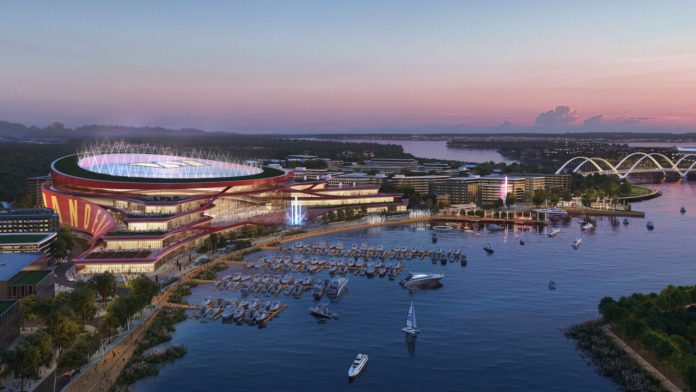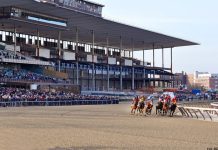The historic rivalry between Washington, D.C. and New York City—rooted in the ideological battles of Alexander Hamilton and Thomas Jefferson—is entering a new chapter. This time, the battleground is sports and entertainment infrastructure, and Washington is making a bold move to challenge New York’s dominance.
Washington’s $3.5 Billion Stadium Vision
Washington officials have unveiled plans for a state-of-the-art domed stadium on the former RFK Stadium site, poised to become the new home of the Washington Commanders. But this isn’t just about football—it’s the centerpiece of a $3.5 billion mixed-use development that includes:
- A year-round entertainment venue
- Retail and dining spaces
- Residential and commercial zones
- Transit-oriented infrastructure upgrades
The stadium is designed to rival MetLife Stadium, which has long been the go-to venue for Super Bowls, sold-out concerts, and other marquee events in the New York metropolitan area.
MetLife’s Reign and Washington’s Response
Located just across the George Washington Bridge, MetLife Stadium has consistently drawn major events away from the National Capital Region. Washington’s new stadium aims to change that by offering:
- Year-round flexibility for sports, concerts, and conventions
- World-class amenities and fan experiences
- A strategic location with improved transit access
This development signals Washington’s intent to become a premier destination for sports and entertainment, reshaping its cultural identity and economic future.
Economic and Cultural Impact
If successful, the stadium project could:
- Generate thousands of jobs and boost local businesses
- Attract national and international events
- Reignite civic pride and regional competitiveness
- Reframe the Washington vs. New York rivalry as a modern contest for cultural influence
The race is on in Washington, D.C., as Mayor Muriel Bowser and the Washington Commanders are urging the D.C. Council to swiftly approve a deal for a new domed stadium on the RFK site. The urgency stems from a strategic goal: positioning the city to host matches for two major global sporting events—the 2031 FIFA Women’s World Cup and the 2031 Men’s Rugby World Cup, both set to take place in the United States.
Why the Rush?
- D.C. missed out on hosting games during the 2026 FIFA Men’s World Cup, a rare snub for a host nation’s capital
- A new stadium would offer year-round flexibility, world-class amenities, and the infrastructure needed to attract international tournaments. Economic officials estimate the events could generate up to $750 million in economic impact for the District
MUST READS
The push to redevelop the RFK Stadium site into a state-of-the-art NFL venue is intensifying, as the Washington Commanders and Mayor Muriel Bowser urge the D.C. Council to approve the stadium deal swiftly. The urgency is tied to Washington’s bid to host matches for the 2031 FIFA Women’s World Cup and the 2031 Men’s Rugby World Cup, both set to take place in the United States.
Why 2031 Is a Pivotal Year
- D.C. was excluded from the 2026 FIFA Men’s World Cup, a rare snub for a host nation’s capital
- A new stadium could generate up to $750 million in economic impact, according to Commanders executive Andy VanHorn
- The city is already in active discussions to host matches for both 2031 tournaments
A modern venue would not only elevate D.C.’s sports infrastructure but also strengthen its bid for global events that bring tourism, jobs, and international visibility.
Political Drama: Trump’s Potential Involvement
In a surprising twist, the Commanders have warned the D.C. Council that delaying the stadium vote could open the door for President Trump to intervene. According to Axios, Trump’s connections to the White House and federal design commissions could give him leverage in pushing the project forward.
- Trump’s involvement is seen as a last-resort measure this is an issue that the city council can make happen but not buy July 15th proposed deadline. The D.C. Council supports the stadium, but insists on completing a due diligence process
- The situation remains fluid, with negotiations and political maneuvering ongoing







